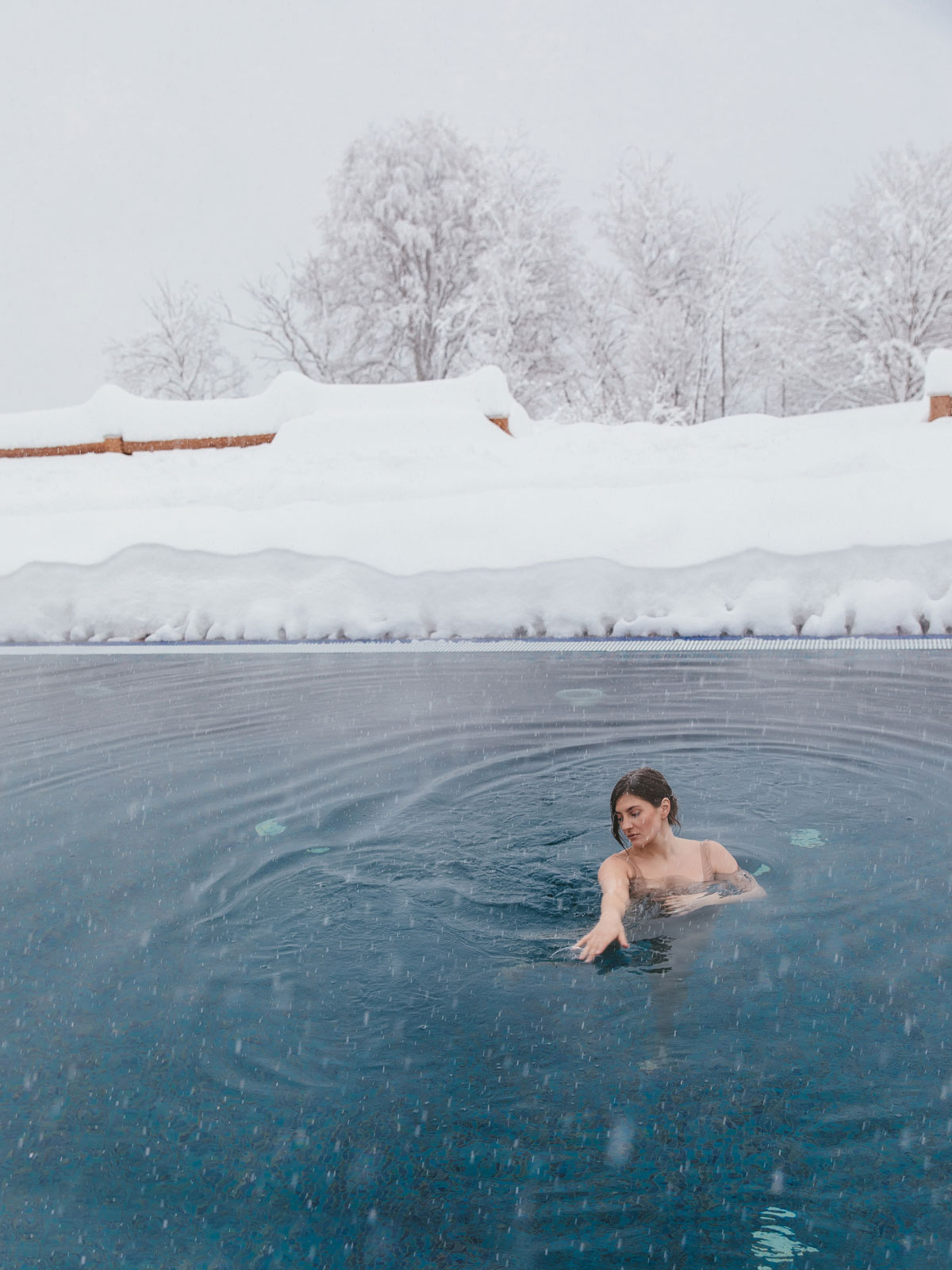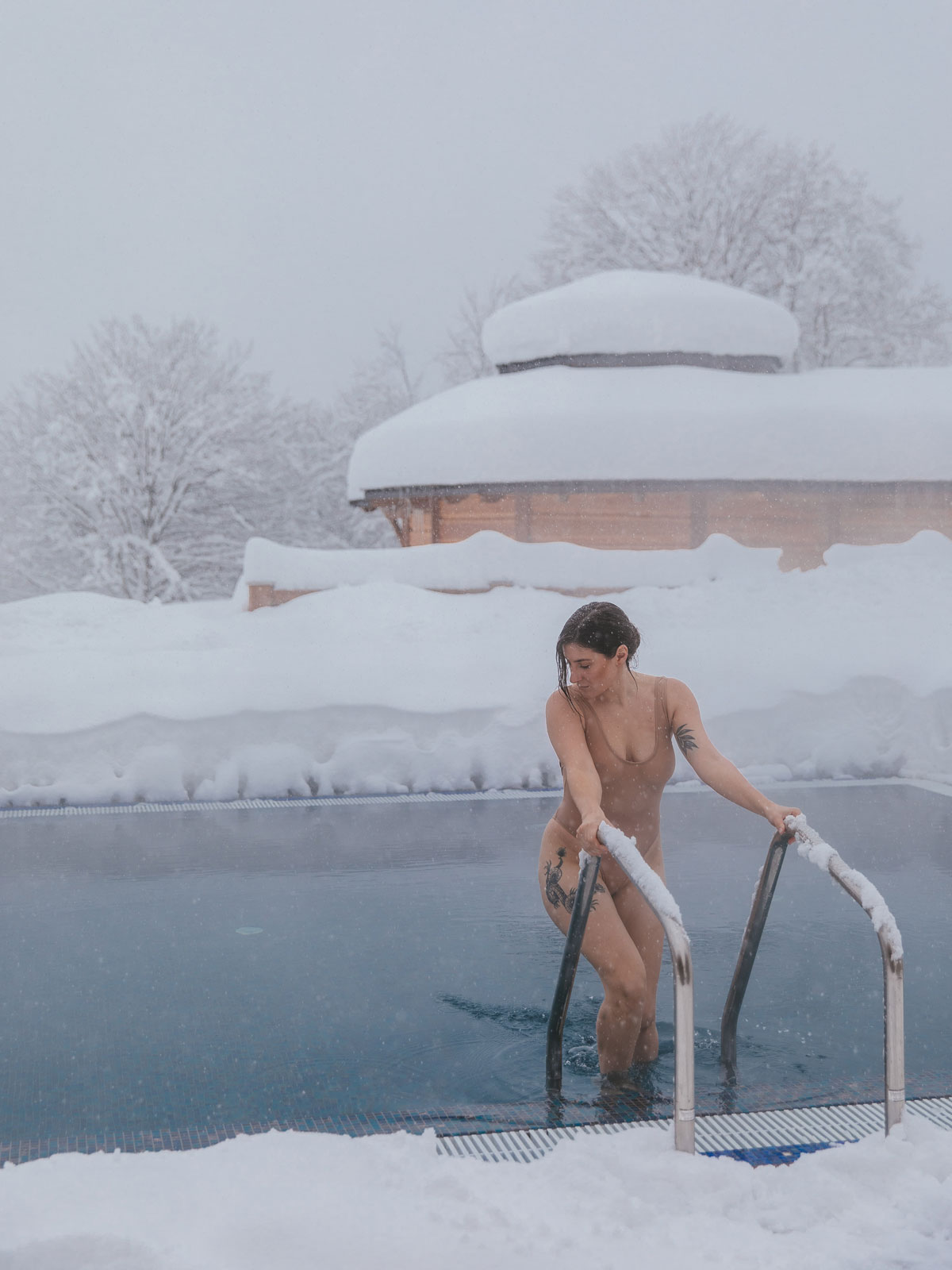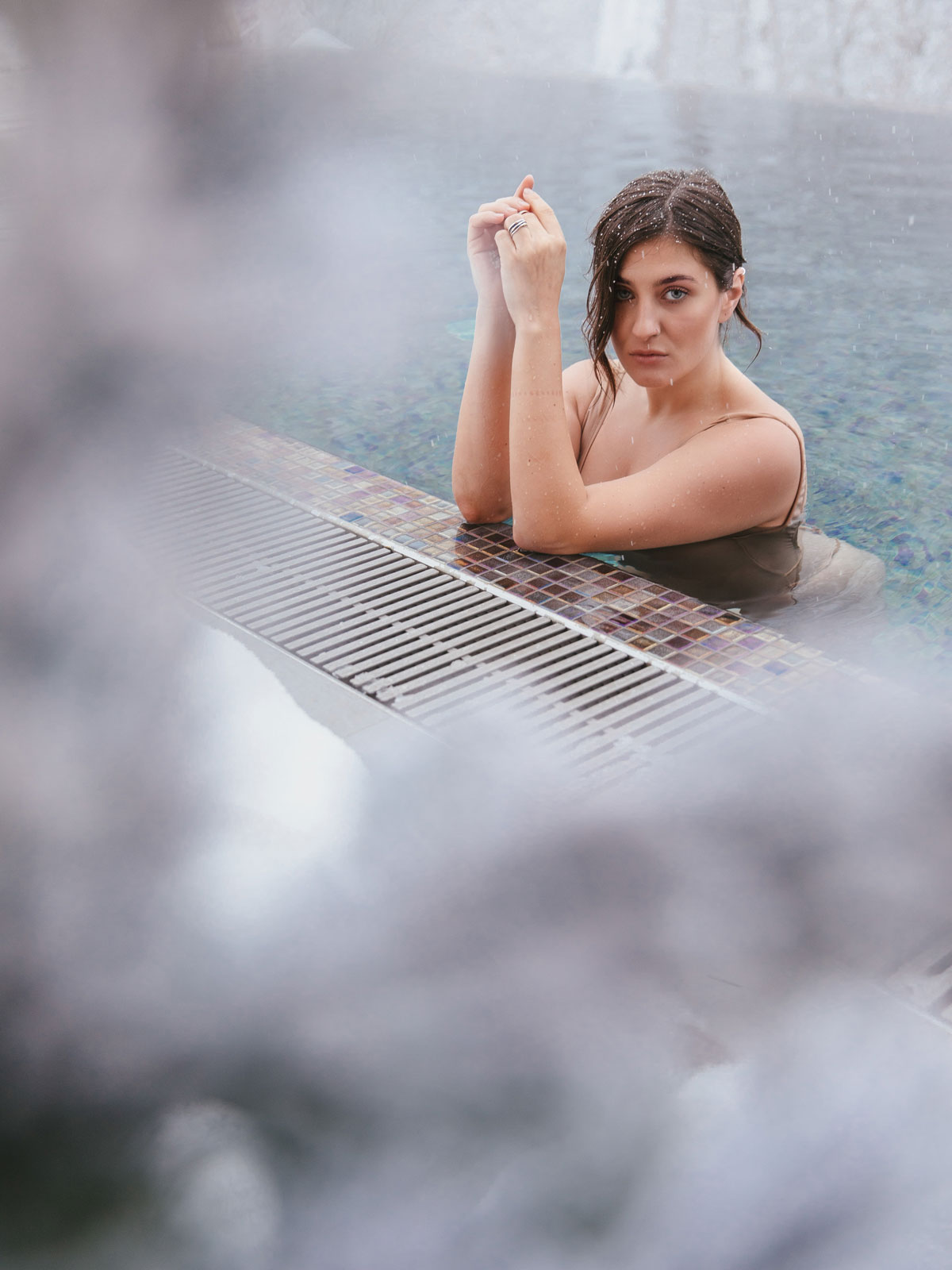
Last year we had a massive heat wave in the PNW, and I drove out to the ocean after a week of relentless heat. I found a beach and posted up there for a while. When I walked into the water for a cold swim in just my bathing suit, I’ve never gotten so many stares in my life. I guess…people don’t swim in the ocean up here because of how cold the water is? But it turns out that I am not that weird! Because the hashtag #coldplunge has 1.1 billion views on TikTok so I’m not the only one. People on TikTok say that cold baths can do everything from boost your immune system to improving your mental health. But is any of that really true? The good folks at Yahoo have compiled some facts for us about the benefits of cold swims, and how to do it correctly to minimize risks. The water doesn’t have to be as cold as you think to be effective.
How to cold plunge: A cold plunge involves immersing yourself in cold water — either quickly in and out or for several minutes. During a cold plunge, the water is typically between 50 to 70 degrees Fahrenheit or about 10 to 20 degrees Celsius, Dr. Kristi Colbenson, a sports medicine and emergency physician at the Mayo Clinic, tells TODAY.com. The length of a cold plunge can vary depending on the water temperature and comfort level. The colder the water, the shorter the submergence should be, the experts note. In general, cold plunges typically last between five and 10 minutes, Colbenson adds.
Cold water swims can help with recovery from exercise and muscle soreness: From a physiological standpoint, the biggest benefit from cold water immersion seems to be improvement in recovery, the perception of pain and delayed muscle soreness, says Colbenson. A systematic review published in the journal Sports Medicine in February 2022 suggested that cold water immersion was an effective recovery tool after high intensity exercises, specifically HIIT exercises, TODAY.com previously reported.
Cold swims may be good for stress tolerance: Also known as a cold shock response, the initial gasping, hyperventilating and increased heart rate after jumping into frigid water can be dangerous — but it may also be the basis of some of the physical benefits, says Tipton. “The belief is that if you consistently expose yourself to stress in a meaningful and structured way, your body will actually respond by improving its ability to respond to everyday stress,” says Colbenson.
Claims about immune system benefits don’t have enough evidence: However, the evidence that cold water immersion improves the body’s immune function, is lacking, the experts note. “From an immunologic standpoint, or your ability to fight infection, I give caution to that. … There hasn’t been a good study that says there is a decreased propensity of getting infection if you use cold water immersion,” Colbenson adds.
We know even less about mental health benefits: When it comes to the mental health benefits of cold plunges, these are even less studied or understood, the experts note. However, there are many anecdotal testimonies about the mind-boosting effects of cold water immersion and a few possible theories. In the short-term, cold plunges can increase levels of dopamine and endorphins, says Colbenson, which can contribute to a feeling of euphoria and heightened mental clarity or focus right after.
The article notes that people should not take cold swims if they have any cardiovascular issues, including high blood pressure or arrhythmia. I love cold swims because they give me a feeling of euphoria and a “body high”. But I can only tolerate them in the ocean for some reason, so I don’t do them for exercise recovery. I do occasionally make a game for myself to see if I can sneak up behind a surfer and surprise him, but I am a little bit sadistic sometimes. But I have a lovely friend in Switzerland who took cold plunges on the regular for years. This is what she told me about why she likes them:
“To be honest when I first started it was for weight loss–I had a friend who was doing it every day and she started to lose weight without even realizing it. But in the end, for me the benefits were really about my state of mind. I felt invigorated, more alive. Also, and I have zero science behind me, but I really do think it helped my immune system. When I went regularly, I really was healthier. People around me were getting colds and I was fine….and somehow it was really good for my mental health too. It’s like meditation. When you’re in the cold water you have to really focus on the here and now so it helps clear your mind of negativity and stress.” She also advises not to jump into a hot shower or bath directly afterwards and let your body warm up naturally. Does anyone else share our passion for cold swims?
photos credit: Yaroslav Shuraev on Pexels













No! But perhaps I will increase the cold water blast time in the shower. Okay, *colder*. 😵
Cold showers, immediately after my regular warm showers, have helped me wean off of antidepressants. A friend recommended it to control hot flashes. Her acupuncturist advised staying in a cold bath or shower for 2 minutes. I read about the mental health anecdotal evidence, so I started doing it as I weaned off of Zoloft. Perhaps it is psychosomatic. I don’t care, because I feel better and have completely weaned off of the medication. And I continue to do it every time I shower.
My husband taught me that divers acclimate to cold water by making sure that their foreheads get hit with the cold water first. I allow the cold water to run on my face first, then I lift my hair and allow the cold water to run at the base of my neck down my back and spine. Then I get the shower wand and make sure that the cold water gets all over me for at least 2 minutes.
I am recovering from a nervous breakdown due to over a decade of domestic violence. Happy and safe now.
💕
A cold plunge for 3 minutes will activate your vagus nerve and bring you back to parasympathetic state (non-fight/flight mode). If you can’t do a full body plunge and are in a melt down, plunging just your face in ice water water for 15 to 30 seconds also works and will calm you down immediately. It’s awesome! Has helped me so much in my trauma healing journey.
From google: “What happens when the vagus nerve is triggered? The vagus nerve stimulates certain muscles in the heart that help to slow heart rate. When it overreacts, it can cause a sudden drop in heart rate and blood pressure, resulting in fainting. This is known as vasovagal syncope.”
Diaphragmatic breathing also stimulates the vagus nerve! That’s my preferred method because I HATE the cold.
tapping too. I hate the cold method too, but I love how fast it works and for me lasts a long time too.
Some people absolutely do swim in the Pacific Northwest coastal waters but not as often as elsewhere because it does get very cold there. Some areas are also quite dangerous for swimming, whether it is from very serious undertows, sneaker waves or incoming debris like tree logs. As a kid I had been pulled out by an undertow several hundred feet and I had only been standing in knee deep water. I also personally knew, as a kid, a couple of teens who had drowned at the coast in separate incidences, so perhaps some locals are just more aware of the dangers!
I was gonna say the same thing! When I moved to the PNW I had no idea how dangerous the coastal swimming was. We have a bay where I live though and lots of folks swim in it all summer long. Its crisp, crystal clear and wonderful. I also know several winter plungers which is a no for me, i have to say!
I grew up in Oregon, and whenever we went to the coast for a weekend my brother & I would have contests to see who could wade into the water & stay the longest, or who could wade in the deepest–just below the knee or above? all the way to the hips? the waist?!. I could usually outlast him! But swimming in the water? Nah, we swam in the rivers (Applegate & Rogue) but never the ocean.
I like to do this in lakes and rivers. Not so much pools. I have to talk myself into it every time, but it’s always worth it. Once you get past the shock, it feels amazing. I wish my favorite lake was a little closer, but I suppose an hour drive can be a typical commute for many people.
Is something happening on CB to make all the comments so tiny?
Just me?
@HeyKay, it looks the same as usual to me. Maybe try clearing your cache and reloading your browser?
~Signed, Not a tech support person but wanted you to know somebody heard you xo
Will this work to lessen major period cramps? Asking for me
Yes, love to
A cold plunge is one thing, a cold swim is another. I have a neuropathy that gets even worse in cold water. I’ve noticed lately in my weekly hour-long lap swim session, that if the water is 82 degrees or less, my hands will start tingling with about 10-15 minutes left in the swim. It hits quicker earlier if it’s colder, so I tend to spend only a half hour in the pool if it’s only 80.
But that’s me. And I expect possibly other folks with malfunctioning extremities. I watch a lot of foreign TV shows on various streaming services, and I’ve noticed a lot of those folks way up there in the north–far northern Canada, Finland, Sweden, Norway, Denmark, Germany, and gosh I don’t remember where all–start their day with a cold plunge of about five minutes. I remember one female detective doing that, she & others would walk out to this little dock, climb down the ladder into the water, with stocking caps on!, and tread water for a few minutes, then climb back out. Every day, year round. In other shows they’re in the sauna first, then do a cold plunge. And I have a coworker who swims for a length of time daily, year-round, in Lake Chelan, which is on the east side in Washington. She swears by it.
My purely anecdotal ‘evidence’ to be sure 🙂 but I think there is something to this. I jumped into the Mediterranean in early May – the water was only 15•C where we were – but so redonkulously gorgeous and clear it felt like it was calling me. It did something for me, massively refreshing, I felt like my mind and body had done a reset after swimming around for a while – the feeling of cold became a feeling of being reinvigorated as I moved. It was nice to be on vacation to be sure, but I couldn’t shake this feeling of being stressed and irritable and not sleeping well before that – a dumb sort of ‘vacation stress’ I guess, or being unable to detach from normal work life. Def a ‘before and after’ jumping in when I think of that trip. I felt better for days/weeks afterward. Made me feel extra alive or something.
People with certain heart conditions or disorders have to be careful with cold water swimming and baths. Always listen to your body.
I have low blood pressure and sometimes (extremely rarely) feel faint when outside atmosphere (or my blood pressure) changes rapidly, and I felt faint after one such moderately cold plunge/swim (water was maybe 74 but it was 100 outside), so just a word of warning to be careful.